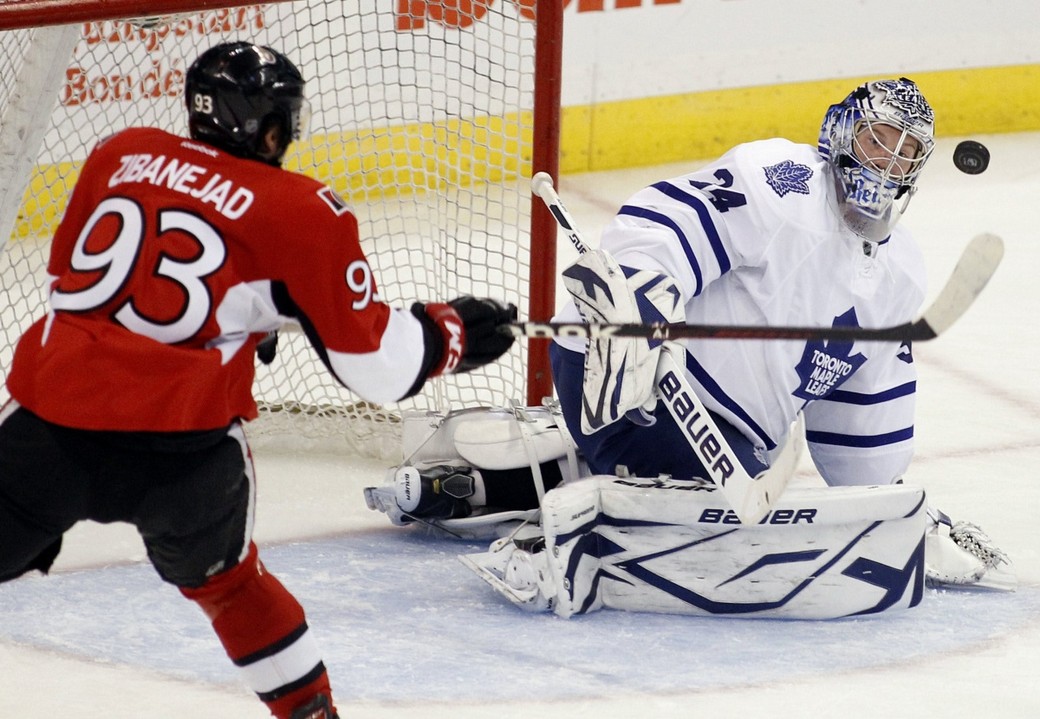
Zibanejad is a Star Ready to Explode
Zibanejad attempts to knock a puck out of mid-air past Toronto Maple Leafs goaltender James Reimer. Photo credit: Blair Gable/Reuters
If you’re concerned about Mika Zibanejad ever realizing his potential after being a healthy scratch against the St. Louis Blues on November 25, don’t be.
When Zibanejad was drafted sixth overall by the Ottawa Senators in the 2011 NHL Entry Draft, he was immediately pegged as the franchise’s future number one center.
Zibanejad had lofty expectations to meet from the outset, and for a 21-year-old transitioning to the top league in the world, he’s doing just fine.
After an initial nine-game stint in the 2011-12 campaign, in which he registered one assist, the Stockholm-native was sent back to the Swedish Elite League. He started the following campaign in the American Hockey League, eventually finding his way into a permanent role in the NHL, producing 20 points in 42 games in his rookie season. In 2013-14, he ran into a minor setback after being sent to the minors straight out of training camp. But the six-foot-two, 211-pound center was persistent with seven points in six games for the Binghamton Senators. He then notched career-highs across the board with 16 goals and 33 points in 69 games for Ottawa—not bad for a sophomore.
This season, however, Zibanejad is off to a slow start with six points in 20 games. He’s been called out for a lack of consistency, and that may be true to some extent, but the truth of the matter is that he’s simply due for better luck.

A quick look at his shooting percentage reveals a sustainable 10.7 per cent, which doesn’t seem to bode well for Zibanejad, but consider all three of his goals were scored on the powerplay. Producing on the man-advantage is certainly a good thing, but what about his even-strength play? After all, most of the game is played five-on-five, so analyzing a player at even-strength is more indicative of their value.
In that department, Zibanejad’s 6.8 on-ice shooting percentage is one of the lowest on the Senators—only David Legwand, Patrick Wiercioch, Chris Neil and Zack Smith are worse— according to Behind The Net. Considering his respective shooting percentage was 8.63 and 8.03 per cent in his two previous seasons, he’s due for an increase here.
And he doesn’t fare any better in his PDO rating either, which accounts for even-strength shooting percentage and save percentage while on the ice, as he is ranked the fifth lowest on the team.
Now consider that Zibanejad ranked 22nd and 18th, respectively, in even-strength ice-time among all Senators in his two previous seasons. In 2014-15, he ranks 16th, and ninth among forwards, with just over 10 minutes per game. Including this season, the right handed shooter has ranked sixth, eighth, and sixth during the past three years in average powerplay time-on-ice per game among forwards, according to NHL.com.
It is difficult for any player in the NHL to surpass more than 50 points with those minutes. Zibanejad averaged .48 points-per-game before this season, nearly 41 points on average, which is pretty impressive, all things considered.
If you discount his run of bad luck thus far, there is no reason for concern regarding Zibanejad’s development in the NHL. In fact, most players tend to break out during their fourth season, perhaps due to proper acclimation, so the young Swede has plenty of time to realize his elite potential.









